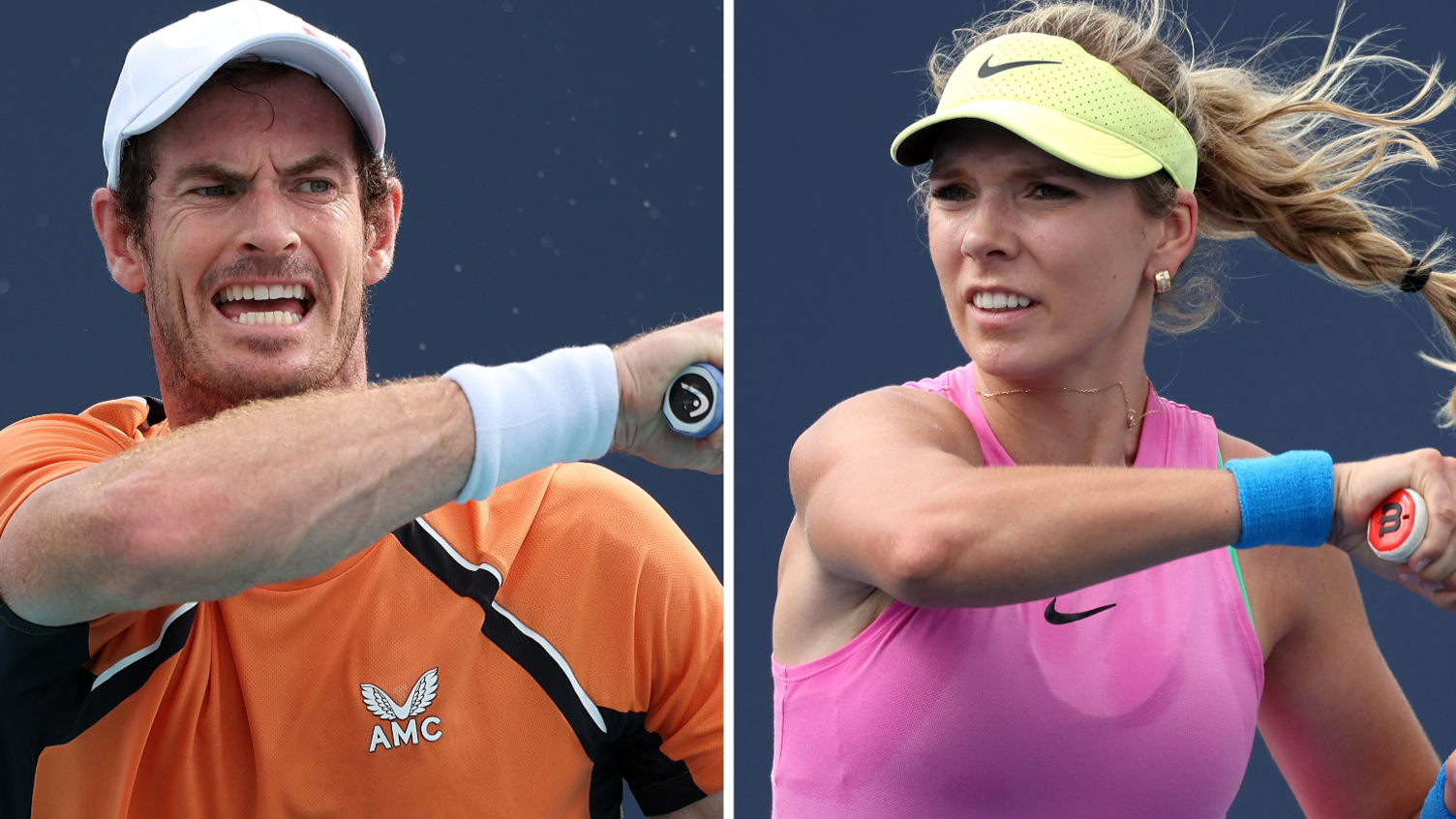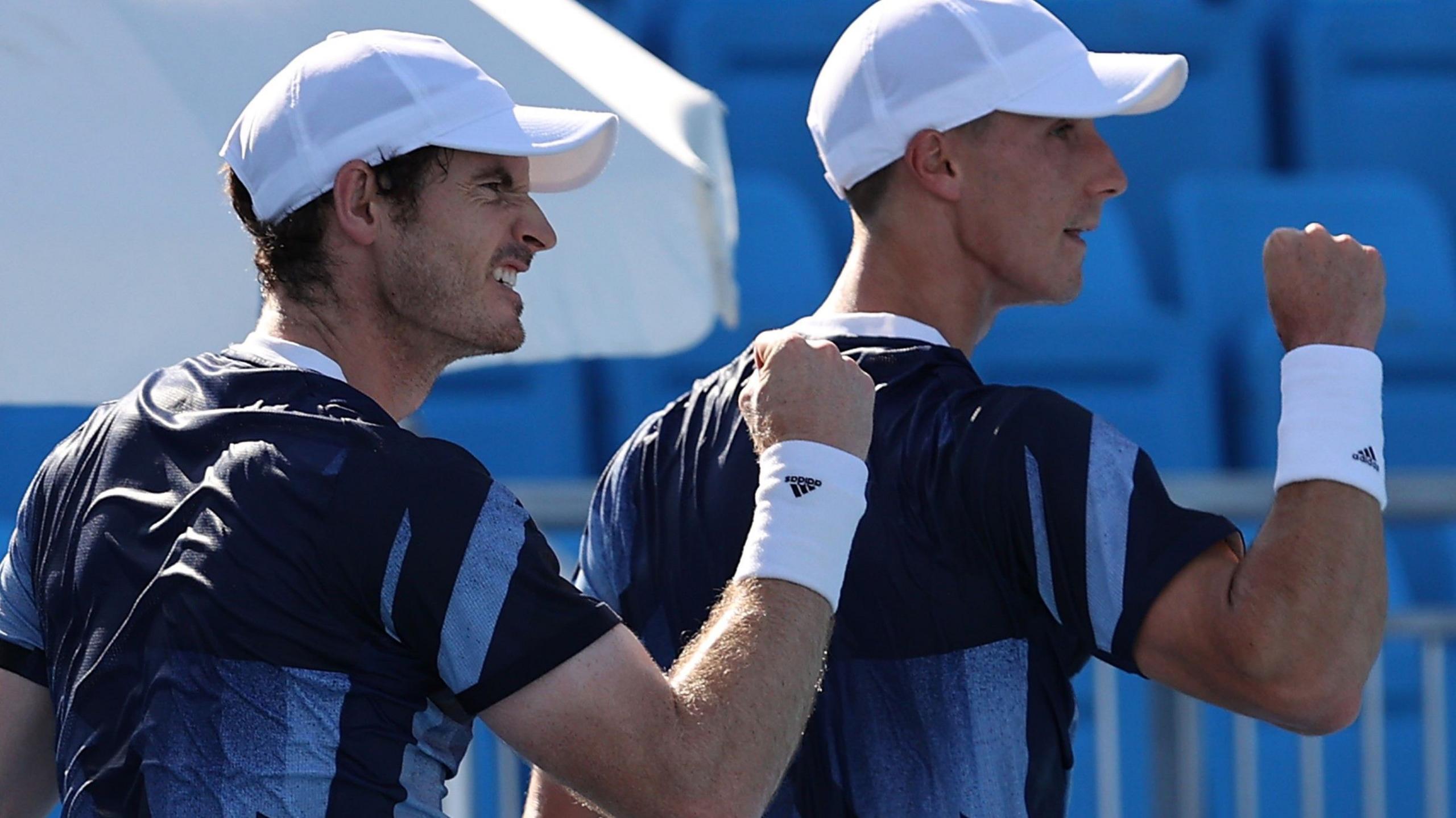How does French Open affect Olympic qualification?

Andy Murray (left) has played at four Olympic Games, while Katie Boulter has yet to play one
- Published
Paris will stage two of this summer's great sporting events, with next week's French Open offering players a return ticket to Roland Garros for the Olympic tennis competition.
Rankings at the end of the tournament will determine whether players make the cut for July's Games.
BBC Sport looks at how it all works - and who could miss out.
How does Olympic qualification work?
There will be five events at the Paris Games - men's singles and doubles, women's singles and doubles, and mixed doubles. Each country can qualify up to 12 players, external, with four men and four women allowed to compete in the singles.
Of the 64 players in each singles draw, 56 will qualify from the world rankings on 10 June.
Some players who qualify may choose to skip the Olympics to play on the ATP and WTA Tour, which provide ranking points, while some will miss out because of the strength in depth of their nation.
Anyone in the top 70 will feel they have a very good chance of qualifying for the Games - and winning a round or two at the French Open could make all the difference.
Who could play for Great Britain in singles?
World number 33 Cameron Norrie and Jack Draper, ranked 35th, have nothing to worry about and have expressed a desire to take part.
Dan Evans is currently ranked 60th and can also feel relatively confident with no points to defend at Roland Garros.
As it stands, Katie Boulter will be the sole British representative in the women's singles, unless world number 91 Harriet Dart can make a late run.
Heather Watson will likely make the team as a doubles player to partner Boulter.
What about Andy Murray?
Andy Murray stands at 75 in the rankings but would be eligible for one of two International Tennis Federation places reserved for former Grand Slam champions and Olympic gold medallists.
Rafael Nadal and Stan Wawrinka may also want one of those. Nadal would receive the first place on the strength of the number of those titles he has won, while Murray would pip fellow three-time major champion Wawrinka because of his two Olympic singles golds.
And Emma Raducanu?
There is a very narrow path into the Games for Britain's Raducanu, but her decision to skip the French Open to prepare for the upcoming grass and hard-court seasons would seem to indicate she will not be pursuing it.
Having missed eight months after surgery, she can enter with a protected ranking of 103, but that would almost certainly be too low for direct entry.
Competition for the Grand Slam champion places is likely to be fierce on the women's side. Naomi Osaka, Angelique Kerber and Simona Halep are all multiple major winners, although Osaka and Kerber also have protected rankings they could take advantage of.
Who could play for Great Britain in doubles?

Andy Murray (left) paired up with Joe Salisbury at the Tokyo Olympics, which were held in 2021
If four British men qualify to play singles, it potentially becomes more straightforward.
World number five Joe Salisbury and 10th-ranked Neal Skupski could complete the maximum six-man team: Skupski to play with Evans, with whom he has enjoyed previous success, and Salisbury with Murray, having only been denied a semi-final place in Tokyo by a brilliant Croatian comeback from Marin Cilic and Ivan Dodig.
But if Evans does not make the team, it becomes trickier, especially as Salisbury and Skupski are open about the fact they would prefer to play together.
"We definitely enjoy playing together and think we can do well. I think that would be the number one choice for both of us," Salisbury told BBC Sport at the Madrid Open.
"I've always loved playing with Joe," Skupski added.
"Every time I get on court with Joe, it's real special and hopefully we can play the Olympics together. We are just waiting to see what the guys at the LTA think."
Only top-10 players are guaranteed a place in the draw, and so Skupski may have to match last year's run to the French Open quarter-finals to make sure of that position.
Entry is otherwise determined by a pair's combined ranking, which is calculated by adding their singles or doubles ranking together.
If Murray says he would like to play both singles and doubles, it would be a brave call to deny him the opportunity in what is expected to be the final tournament of a glittering career.
Medals are also on offer in the mixed doubles, which allows no more than one pair per country. The entry list will be drawn up from the rankings in the week before the Games, with places only available to previously selected players. As things stand, Salisbury and Boulter would have the strongest chance of earning a place in the draw, but Boulter may not feel able to play in all three events.
Who are the other big names to watch for?
The Olympics will very likely be Nadal's final chance to play at his beloved Roland Garros.
It could also be Novak Djokovic's last chance to win a much-desired Olympic gold. He won singles bronze in Beijing in 2008, but has lost three times at the semi-final stage.
On the women's side, three-time French Open champion Iga Swiatek has already said she intends to play.
When will the entry list be decided?
National Olympic Committees must confirm by 19 June whether they want to take up the places offered by the ITF.
The final entry lists will be published on 8 July, which is the start of the second week of Wimbledon.
When does the Olympic tennis take place?
The Paris Olympics take place from Friday, 26 July to Sunday, 11 August.
The tennis is held from 27 July-4 August. The women's gold medal match is on 3 August, with the men's the day after.